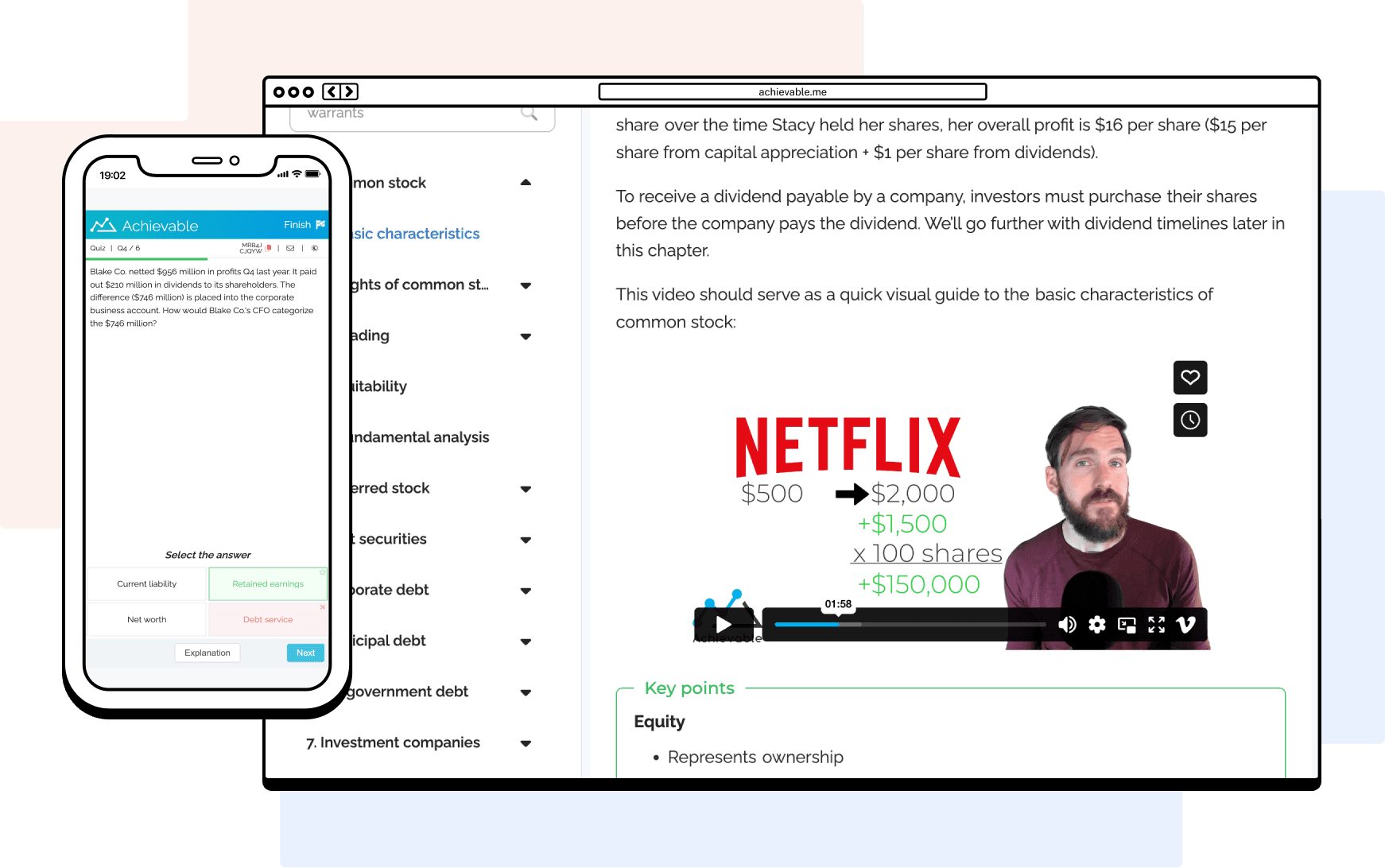

Free FINRA Series 65 practice exam
Mortality risk as associated with a variable annuity is best described as being associated with:
- I. The annuitant passing away earlier than expected\\
- II. The annuitant passing away later than expected\\
- III. The account's value less than basis\\
- IV. The account's value greater than basis
An investment adviser that is dual registered as a broker-dealer plans on performing agency cross transactions from time to time. In order to do so, which requirement(s) must be met?
- I. A confirmation the transaction occurred at the national best bid and offer\\
- II. Written disclosure provided to clients documenting the details of an agency cross transaction\\
- III. An annual disclosure detailing the total number of agency cross transactions performed\\
- IV. A confirmation with trade details is provided by settlement of the trade
Which of the following are components of the yield to maturity calculation for callable debt security?
- I. Redemption value\\
- II. Number of years until the bond matures\\
- III. Redemption value at call\\
- IV. Number of years until the bond is called
Assuming the economy is on the brink of recession, what statements related to economic theories are false?
- I. Demand-side economists advocate for increased government spending\\
- II. Supply-side economists advocate for increased government spending\\
- III. Demand-side economists advocate for decreased government spending\\
- IV. Supply-side economists advocate for decreased government spending
A company financial statement looks as follows:
$75,000 - current assets\\
$2,400,000 - long-term assets\\
$175,000 - current liabilities\\
$150,000 - long-term liabilities\\
$2,150,000 - net worth
What type of corporate financial disclosure form is this?
The following fixed income securities are available to an investor:
- Security A: 4% coupon, 15 year bond, $20 NPV
- Security B: Zero coupon, 20 year bond, $40 NPV
- Security C: 9% coupon, 30 year bond, $5 NPV
- Security D: 12% coupon, 24 year bond, -$10 NPV
Assuming the investor is utilizing discount cash flow techniques, which is the most likely to be purchased?
An investor's portfolio allocation is:
10% small cap growth funds\\
50% large cap growth funds\\
15% sector funds\\
15% emerging market funds\\
5% speculative grade corporate bonds\\
5% money markets
What investment objective does this portfolio align closest to?
Which of the following statements related to QTPs is/are correct?
- I. Beneficiary changes may be made once per calendar year\\
- II. Investment allocation changes may be made once per calendar year\\
- III. State plan changes may be made once per calendar year
A 50 year old investor with a $3,000,000 portfolio specifies tax advantaged income as their investment objective. Their current asset allocation of their portfolio is:
20% growth stocks\\
20% value stocks\\
10% preferred stocks\\
20% long term corporate bonds\\
25% long term municipal bonds\\
5% money markets
Which of the following statements is most accurate?
The state administrator takes punitive action against a person, resulting in their inability to offer securities products and services. After the notice of punitive action has been issued, what additional obligations must the administrator provide to the person?
- I. Opportunity for a hearing\\
- II. Disclosures of written facts and findings of law\\
- III. Opportunity for re-application\\
- IV. Disclosure of NASAA employee signing off on action
A number of analytics and tools can be used to determine if a security is worth an investment. One of those resources is discounted cash flow. Which of the following statements regarding this type of analysis is true?
- I. Future value determines the current value of future cash flows\\
- II. NPV is the difference between a security's present value and cost\\
- III. IRR is most accurate when analyzing fixed income cash flows\\
- IV. The discount rate is equal to CPI
Briar Distributions Company reports the following on their ongoing public finance disclosure form:
Cash: $400,000 \\
Inventory: $2,200,000 \\
Accounts receivable: $12,800,000 \\
Accounts payable: $1,000,000\\
Taxes payable: $1,200,000 \\
Mortgage bond outstanding: $10,900,000
What is the reported net working capital for Briar Distributions Company?
To open an options account, certain protocols and procedures must be followed. Rank the following steps in order from first to last:
- I. Options Disclosure Document provided\\
- II. Principal approval obtained\\
- III. Options Agreement signed and submitted\\
- IV. New account form filled out
Of the following choices provided, which would be considered a broker-dealer according to the Uniform Securities Act?
- I. A person effecting securities transactions for their own account\\
- II. A person making securities recommendations for compensation\\
- III. A person effecting securities transactions for the accounts of others\\
- IV. A natural person representing an issuer during the sale of its securities
A 60 year old investor with a $1,500,000 portfolio specifies safety of principal as their investment objective. Their current asset allocation of their portfolio is:
5% value stocks\\
5% growth stocks\\
15% preferred stocks\\
65% long term bonds\\
10% money markets
Which of the following statements is most accurate?
An investor's portfolio was recently allocated in the following manner:
60% stock\\
35% bonds\\
5% money markets
A few months later, the investor's financial adviser recommends a deviation from their allocation in order to take advantage of a short term opportunity in the stock market. What allocation style is the adviser utilizing for this change?
Which of the following statements related to the initial registration of a broker-dealer is/are true?
- I. Form ADV must be filed with the state administrator\\
- II. The consent of service of process must be filed and renewed annually\\
- III. A full year's filing fee must be paid, regardless of date of registration\\
- IV. Effective registration lasts until the end of the calendar year
An individual maintains an agreement with a registered investment adviser related to client referrals. In order to find business for the adviser, the individual cold calls prospective clients residing in neighborhoods with high real estate market values. When connecting on a cold call, the individual does not discuss specific securities, but markets the abilities of the adviser. If a prospective client becomes an actual client, the individual collects a finder's fee from the adviser.
What statement is true?
